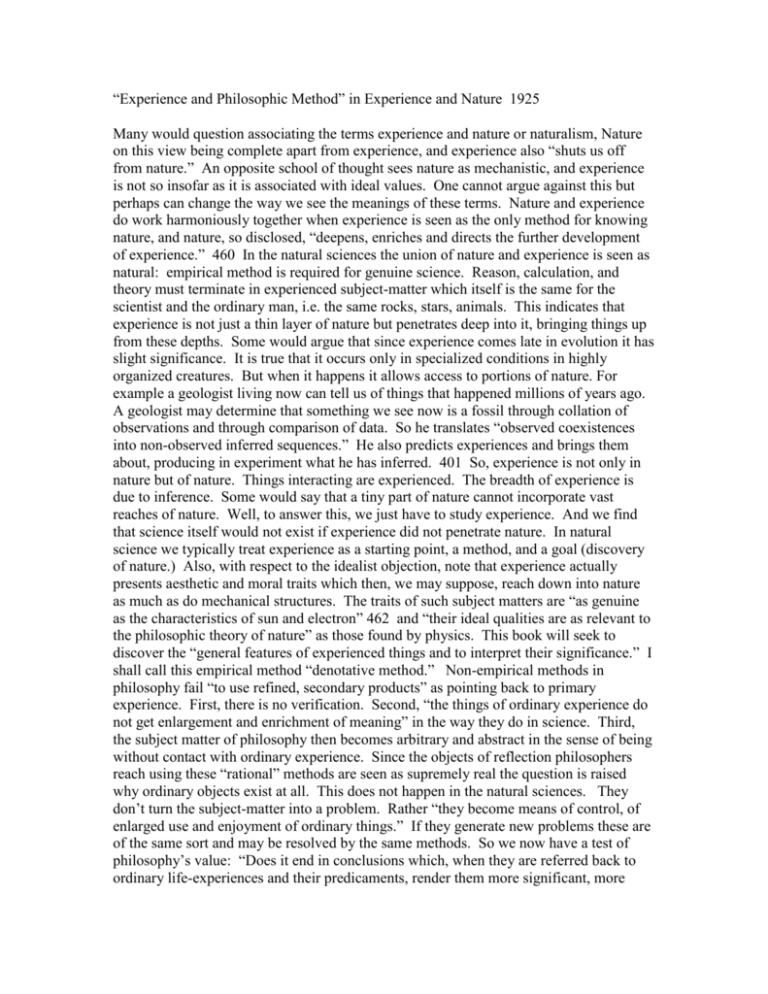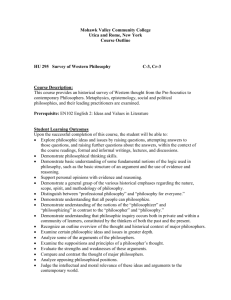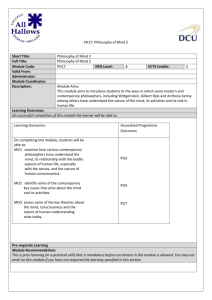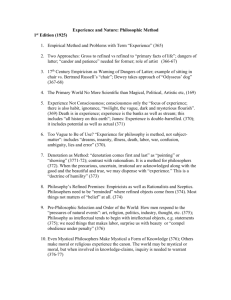Dewey Experience and Philosophic Method
advertisement

“Experience and Philosophic Method” in Experience and Nature 1925 Many would question associating the terms experience and nature or naturalism, Nature on this view being complete apart from experience, and experience also “shuts us off from nature.” An opposite school of thought sees nature as mechanistic, and experience is not so insofar as it is associated with ideal values. One cannot argue against this but perhaps can change the way we see the meanings of these terms. Nature and experience do work harmoniously together when experience is seen as the only method for knowing nature, and nature, so disclosed, “deepens, enriches and directs the further development of experience.” 460 In the natural sciences the union of nature and experience is seen as natural: empirical method is required for genuine science. Reason, calculation, and theory must terminate in experienced subject-matter which itself is the same for the scientist and the ordinary man, i.e. the same rocks, stars, animals. This indicates that experience is not just a thin layer of nature but penetrates deep into it, bringing things up from these depths. Some would argue that since experience comes late in evolution it has slight significance. It is true that it occurs only in specialized conditions in highly organized creatures. But when it happens it allows access to portions of nature. For example a geologist living now can tell us of things that happened millions of years ago. A geologist may determine that something we see now is a fossil through collation of observations and through comparison of data. So he translates “observed coexistences into non-observed inferred sequences.” He also predicts experiences and brings them about, producing in experiment what he has inferred. 401 So, experience is not only in nature but of nature. Things interacting are experienced. The breadth of experience is due to inference. Some would say that a tiny part of nature cannot incorporate vast reaches of nature. Well, to answer this, we just have to study experience. And we find that science itself would not exist if experience did not penetrate nature. In natural science we typically treat experience as a starting point, a method, and a goal (discovery of nature.) Also, with respect to the idealist objection, note that experience actually presents aesthetic and moral traits which then, we may suppose, reach down into nature as much as do mechanical structures. The traits of such subject matters are “as genuine as the characteristics of sun and electron” 462 and “their ideal qualities are as relevant to the philosophic theory of nature” as those found by physics. This book will seek to discover the “general features of experienced things and to interpret their significance.” I shall call this empirical method “denotative method.” Non-empirical methods in philosophy fail “to use refined, secondary products” as pointing back to primary experience. First, there is no verification. Second, “the things of ordinary experience do not get enlargement and enrichment of meaning” in the way they do in science. Third, the subject matter of philosophy then becomes arbitrary and abstract in the sense of being without contact with ordinary experience. Since the objects of reflection philosophers reach using these “rational” methods are seen as supremely real the question is raised why ordinary objects exist at all. This does not happen in the natural sciences. They don’t turn the subject-matter into a problem. Rather “they become means of control, of enlarged use and enjoyment of ordinary things.” If they generate new problems these are of the same sort and may be resolved by the same methods. So we now have a test of philosophy’s value: “Does it end in conclusions which, when they are referred back to ordinary life-experiences and their predicaments, render them more significant, more luminous to us, and make our dealings with them more fruitful?” 463 In illustrating the meaning of empirical method we must recognize that the term “experience” means not only what men do, suffer, strive for, love, believe, and endure, but also how they do all these things, the processes of experiencing. It is both the planted field and the planter. Within experience there is no division between act and material or between subject and object. “Life” and “history” are equally double-barreled, in James’s sense. Life is only broken into external conditions and internal structures through reflection. History, similarly, is both the deeds and the record and interpretation of those deeds. Only empirical method can do justice to the integrity of “experience.” It must get together again what has been torn apart. Why is the whole distinguished into subject and object? The non-empirical method begins with subject and object as separate, and so wonders how an outer world can affect and inner mind, or how the mind can penetrate the world. It makes the fact of knowledge unnatural. It becomes either materialist or idealist. 464 The naturalistic empiricist asks what follows from the distinction between the physical and the psychological. He finds that holding the physical in temporary detachment leads to tools, technologies, mechanisms, all of which can better regulate our lives. Also this gives us enriched meaning and value in things. The history of the physical sciences is that of the possession of tools for dealing with life and action. But ignoring the connection with life makes the world seem indifferent to human interests. It can then be a source of oppression. When objects are isolated from that “through which they are reached and in which they function” experience is reduced to experiencing as complete in itself or as experiencing only itself. The conception of experience as “subjective private consciousness set over against nature, which consists wholly as physical objects, has wrought havoc in philosophy.” It is true that attitudes themselves independently of their objects may be the subject-matter of reflective experience: they cannot be the subjectmatter of primary experience. When they are not abstracted we get truths like that the person who hates finds the object of hatred obnoxious and despicable. It is true also that philosophy takes us away, at least temporarily, from primary experience. Philosophers tend to identify objects of knowledge with ultimately real objects. For example, Spinoza held that emotion is confused thought and when not confused becomes cognition. “That esthetic and moral experience reveal traits of real things as truly as does intellectual experience, that poetry may have a metaphysical import as well as science – is rarely affirmed” without some mystical connotation. 465 Actually, reverie and desire are relevant to philosophy, as are possibilities present to imagination. This includes magic, myth, politics, painting and prisons. If we are going to have a metaphysical theory that discusses the discrete and continuous then social and political life are as important as chemistry. Also, ignorance should be studied as much as wisdom. In general, whatever is actual is possible and the occurrence of an illusion is not itself an illusion. Most significantly, experience includes more than what is currently known, and whereas knowledge needs to include only the distinct and explicit, the vague and the obscure also exist. [This view is quite contrary to that of Peirce!] There are reasons for liking the distinct and evident, but the dark, the potential and the possible also exist. So we cannot assume that nature is all distinct or explicit as do those who divide nature from experience. So, the great vice of philosophy is “intellectualism,” i.e. the assumption that “all experiencing is a mode of knowing” and that all subject-matters may be reduced to the terms of science. Intellectualism goes against the facts of experience. Things are to be acted on and enjoyed even more than to be known. Indeed, if you isolate as real only the aspects of things that are known then you exclude “the characters which make things lovable and contemptible, beautiful and ugly, adorable and awful.” This is why the valuable in things is considered a problem in philosophy. Actually thought and knowledge are subordinate to these other things. The problem is that when real objects are identified with the objects of knowledge then objections related to feeling and willing are relegated to an isolated mind, and the self becomes an alien in the world. This favoring of the cognitive over desire, action, and passion, is a case of the “principle of selective emphasis.” Yes, we need selective emphasis to think, but in ordinary life and in science we do this for a purpose and do not deny what is left out. 467 In philosophy it is ignored that what is left out is as real as what is chosen. Philosophy assumes that the qualities of poetry and friendship aren’t as clearly real as those of matter. People naturally take what is most valuable to them to be the most real. This is OK in everyday life but philosophers tend to become rigid in focusing on what is dear to them as “real.” Philosophical simplifications are due to choice in the sense of concern for the good, on value. Philosophers then transfer what they find good into “fixed traits of real Being.” This happens for social-economic reasons. Philosophers belong to a leisure class, and hence they convert “the eventual” into Being.









